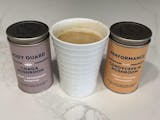Reishi and its Activity Against Viral Infections
Reishi and its Activity Against Diseases
The goal of research in the treatment of viral infections is the discovery of agents that specifically suppress viral multiplication without affecting normal cells. The undesired side effects of antivirals make the development of new agents an urgent requirement, which has led researchers to investigate the antiviral activity of medicinal fungi.
In two separate studies, extracts of Reishi showed inhibitory effects on herpes simplex virus type 1 and herpes simplex virus type 2. One of those studies also monitored vesicular stomatitis virus, which also showed significant inhibitory effects. The authors concluded that Reishi inhibits viral replication by interfering with early events of viral adsorption. (1)(2)
Ganoderic acids, a type of triterpene unique to Reishi, have also been reported to have an inhibitory effect against HIV-1 protease activity. HIV-1 protease is an important therapeutic target for the treatment of HIV infection and AIDS, since protease inhibitors can prevent the production of viral infection. (3)
A separate animal study using ganoderic acid also showed inhibitory effects on the replication of hepatitis B virus (HBV). Hepatitis B is a viral infection that attacks the liver and can cause both acute and chronic disease. Production of HBV antigens were up to 44% higher than that of controls without ganoderic acid from Reishi. The same animal study showed protection from E.coli infection in the liver. (4)
In 1986, a large clinical study of 355 patients diagnosed with Hepatitis B were monitored after treatment with Wulingdan Pill, in which Reishi fruiting bodies is the main active ingredient. 328 of the patients reported to have positive results (that's a 92.4% positive correlation!). (5)
Another interesting study was recorded on 4 elderly patients with Varicella-zoster virus (VZV), which causes chickenpox and herpes zoster (shingles). All 4 patients given Reishi water extract reported to dramatically decrease pain and promote the healing of lesions, without any toxicity even at very high doses. (6)
Click on other conditions to continue exploring studies done on Reishi:
- Bacterial Infections (including E.coli, Bacillus subtilis, Staphylococcus, Salmonella)
- Liver Disease
- Diabetes
- Kidney Disease (Nephritis, Renal ischemia, Proteinuria)
- Sleeping Disorders (Insomnia, Sleep apnea)
- Cardiovascular Disease (Hyperlipidemia, Atherosclerosis, Leukopenia)
- Rheumatoid Arthritis
- Neurasthenia (Fatigue, Depression)
- Respiratory Disease (Bronchitis, Asthma, Allergies)
- Gastrointestinal Disease (Gastric ulcers, Crohn’s disease)
- Anorexia
References:
1. https://www.ncbi.nlm.nih.gov/pubmed/10624872
2. https://www.ncbi.nlm.nih.gov/pubmed/15507347
3. https://www.ncbi.nlm.nih.gov/pubmed/9862140
4. https://www.ncbi.nlm.nih.gov/pubmed/16786250
5. Georges M Halpern. Healing Mushrooms: Effecive treatment for today's illnesses, powerful antioxidant, natural anti-inflammatory, fights viruses and fungus, safe anti-bacterial. Square One Publishers, Inc., Feb 15, 2007 pg.34
6. https://www.ncbi.nlm.nih.gov/pubmed/9862025

